(Universitas Rewind)
Msgr. Fernando Ocáriz, the Prelate of Opus Dei and third successor of Saint Josemaría Escrivá as head of Opus Dei, will be in the Philippines on July 25 to August 5. He is set to have get-togethers with the faithful of Opus Dei, their families, and friends, as well as to visit some of their apostolic and social projects in the country.
As news of his visit to the Philippines this July spread, we look back at his predecessor’s visit to the country in 2008. The articles that follow first appeared in the January 2009 issue of Universitas.
UA&P Honorary Grand Chancellor Visits UA&P
By Mr. Daryl Zamora, Corporate Communications Office
Wearing a white cassock and a purple skullcap (church buffs call it zucchetto), the 76-year-old bishop did not exactly look like a superstar. But the thunderous applause that greeted him at the SMX Exhibition Hall at the SM Mall of Asia said he actually is a superstar…or more.
Bishop Javier Echevarría, Prelate of Opus Dei and Honorary Grand Chancellor of UA&P, visited Manila last July 27 to August 1. On July 29, more than 10,000 people from different parts of the country packed SMX to meet him in an hour-long general get-together. To them, the bishop was more than a celebrity: he was “the Father.”
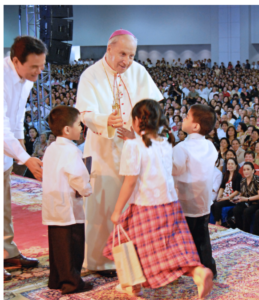
Photo from the Opus Dei Information Office.
As head of the Prelature of Opus Dei— an organization of Catholic priests and lay people—Bishop Echevarría is father to more than 80,000 Opus Dei members worldwide and hundreds of thousands more who assimilate the teachings of Opus Dei founder St. Josemaría Escrivá. He is the head of and figure of unity in the prelature. Members of Opus Dei and many others believe that next to the Pope, the Prelate reflects to them the love of the One Heavenly Father. He is their guide in serving God.
Saint’s successor
Born and raised in Madrid, Bishop Echevarría was St. Josemaría’s personal secretary from 1953 to 1975, when the saint died unexpectedly in Rome. St. Josemaría fondly called the bishop “Javi.” With doctorates in civil and canon law, Bishop Echevarría was ordained priest in 1955. He became secretary general when Opus Dei was established as a personal prelature in 1982, with Bishop Alvaro del Portillo as the first prelate. In 1994, he succeeded Bishop del Portillo and was ordained bishop by Pope John Paul II in 1995.
Bishop Echevarría was fresh from a similar pastoral visit in Australia and New Zealand when he came to Manila. Though now stooped with age, he still radiated youthful cheerfulness. It had been ten years since his last (and longer) visit to the Philippines. In August 1998, he visited Iloilo and Cebu as well as Manila and some nearby cities.
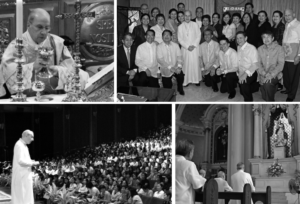
Observers remarked that the bishop exuded a distinct holy air. Indeed, the one in charge of attaching the lapel mic on the bishop’s cassock was overcome by the Prelate’s presence that his hands were trembling as he put the mic on the bishop—unlike those times when he did the same thing for national presidents and other dignitaries. (Bishop Echevarría was simply extraordinary, he later remarked.) With his kind, soul-penetrating eyes, the Prelate simply assured the man there is no need to worry. Snap, and the mic was attached.
Bishop’s work
When Bishop Echevarría spoke, the audience froze in rapt attention. With his priest guardians (custodes) Msgr. Fernando Ocariz and Msgr. Joaquin Alonso behind him, Bishop Echevarría urged everyone to take care of their sacramental life, especially Confession and the Holy Eucharist. He also asked for prayers for the Pope and the apostolic expansion of Opus Dei.
“Ask the Lord that many young women and men decide to spend their lives on this earth for the kingdom of Jesus Christ,” he said in Spanish. Opus Dei (Latin for “work of God”) was founded by St. Josemaría on October 2, 1928 and is active in more than 60 countries. Now it aims to start stable activities in Indonesia and some eastern European countries early next year. In the Church, Opus Dei has the special task of spreading the universal call to holiness and apostolate, echoing St. Josemaría’s reminder that everyone can and should become saints through their ordinary work. Yes, even in things like peeling potatoes, the saint had said. And this is done by offering up one’s daily work to God and turning it into prayer.
In 1964, Opus Dei began in the Philippines when economists Dr. Bernardo M. Villegas and Dr. Jesus P. Estanislao returned home from Harvard. The young PhDs set up the Center for Research and Communication (CRC), which later on became UA&P.
The Prelate at UA&P
Bishop Echevarría had a tight schedule throughout his four-day visit. He met with families, had get-togethers with various groups, and visited shrines and ecclesiastical dignitaries. But on July 31, he finally had his official visit to UA&P when he spoke to the University’s executives. His get-together with them stressed on running the University with a healthy Christian secularity, just as St. Josemaría had taught. In the afternoon of the same day, he met with about 500 young men at Li Seng Giap Auditorium and talked about various aspects of Christian life.
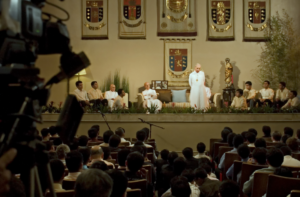
Since its inception in 1995, UA&P has been entrusting its doctrinal and spiritual formation to Opus Dei, recognizing its Prelate as the University’s honorary grand chancellor. Bishop Echevarría therefore provides the school with spiritual guidance through his priests.
Toward the end of his get-together with young men, Bishop Echevarría exhorted his eager audience to be firm in their faith and apply it fruitfully.
When the Prelate left for Singapore on August 1, people who had met him found themselves along EDSA in the usual weekday traffic jam, endured the long queues in MRT stations, and juggled the million and one occupations (and headaches) that make up an ordinary day. Everything was back to normal; the Prelate came and went. One thing changed, though: the people who met Bishop Echevarría and heard his words resolved to “begin again” and strive for holiness in the middle of the world ever more intensely.#
Father of the Family
By Ramon N. Cabrera, CAS 2nd Year
I have always heard the name “Bishop Javier Echevarría.” My old high school—whose spiritual formation is also handled by Opus Dei—has the bishop’s name in many plaques and places. Sometimes I would also hear my teachers mention him. Despite those, however, my knowledge about the Prelate of Opus Dei was limited to the fact that he is the second successor of St. Josemaría Escrivá as head of the prelature.
That is why I was overjoyed when I heard he was coming to the Philippines. At last, I could see the man whose name I’d been hearing and seeing (in pictures) for the past five years.
I was able to attend two get-togethers with him. The first one was the general get-together held at the SMX Exhibition Hall in SM Mall of Asia last July 29. The second was the get-together for male students at the Li Seng Giap Auditorium on July 31.
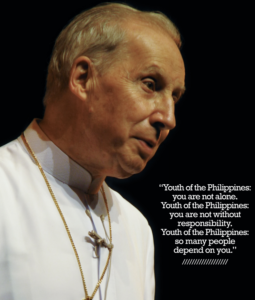
Photo by Charade Castro.
One thing I noticed prior to both events was that many people—mainly members of Opus Dei—referred to the prelate as “the Father.” I was wondering why they called him this way. To satisfy my curiosity, I mustered up some courage to ask no less than the University’s Vice President for Academic Affairs and Corporate Communications, Dr. Jerry Kliatchko, why this was so. His answer was plain and simple: Opus Dei is a spiritual family, and the prelate is the father of that family.
Dr. Kliatchko’s answer was crystal clear, but I only felt the bishop’s “fatherhood” when I heard him myself. In the two get-togethers I attended, I felt that indeed Bishop Echevarría is a father. He talked in a way that was personal. Onstage, he was a father talking to his children, not a bishop preaching to his flock. It seemed as if he were talking to each one of us, teaching us how to contribute to the good of the family.
Bishop Echevarría’s overall message was simple: “Put Christ on top of all human activities,” as St. Josemaría used to say. This message of sanctifying ordinary work or study has always fascinated me. Sometimes we look far to see Christ, and we fail to realize that in fact he is present in our ordinary work. We fail to recognize the sanctifying value of intense work done with the right intention—a work offered to God so diligently such that it could rightly be called prayer.
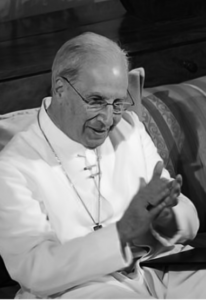 In the get-together for male university students, one of the guys asked the Father how one can still have devotion to the Blessed Virgin Mary even with a hectic schedule. I could certainly relate to the poor fellow. Given the tons of readings I have for PRS or the details I have to take notes of in Dante’s Inferno, I really find little time to tell the Blessed Mother how much I love her.
In the get-together for male university students, one of the guys asked the Father how one can still have devotion to the Blessed Virgin Mary even with a hectic schedule. I could certainly relate to the poor fellow. Given the tons of readings I have for PRS or the details I have to take notes of in Dante’s Inferno, I really find little time to tell the Blessed Mother how much I love her.
To this the Father replied: “Put all your mind in your work, to make it pleasing to God…Tell our Lady, ‘show me how to deal with Jesus,’ and she will show you how to deal with Jesus, even when you are absorbed in intense work done with the right intention.” Indeed, what could be a more pleasing prayer to God (other than the Mass)—coursed through our Blessed Mother—than our work well done?
Of course, the Father also emphasized the importance of sacramental life and prayer. “Deal with our Lord in the Eucharist,” he said. “Love him. Accompany Him.” When one loves a person—let’s say your girlfriend—one is not contented with having that girl as motivation for work. There is always that persistent desire to talk to her personally and spend more time with her to get to know her more.
The Father wanted us to use the same approach in our relationship with our Lord. He encouraged us not only to make God our motivation, but also to talk to him in prayer and to frequent the Sacraments, most especially the Holy Mass, wherein we receive Christ himself. And of course, we should try to be more acquainted with those close to Our Lord. And who could be closer to him than his Blessed Mother, Mary?
My encounter with the Father ended with this challenge to you and me: “Youth of the Philippines: you are not alone. Youth of the Philippines: you are not without responsibility. Youth of the Philippines: so many people depend on you!”#
Leave a Reply